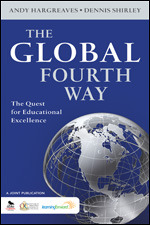The Global Fourth Way
The Quest for Educational Excellence
- Andy Hargreaves - Boston College, USA, Ontario Institute of Studies in Education, Canada
- Dennis Shirley - Boston College, Chestnut Hill, MA, USA, Boston College, USA
This book will operationalize fourth way ideas so that readers can use these new examples, vignettes and strategies to implement their own action plans to achieve positive and sustainable reform. Success stories from around the globe will illustrate how small and large systems are now working with fourth way premises to promote learning and achievement.
"These demanding, exhilarating, and in other ways desperate times require us to provide every single one of our young people with the best education. They require schools that raise all of our students—not just a few, not just those most blessed by wealth and circumstance—to be critical thinkers and innovative problem solvers. They require publics—not just teachers, not just school principals or other educational professions—to acknowledge in deed as well as word that all of our young people deserve and require educations that will endow them with a superlative mastery of scientific knowledge, the social studies, and the arts. The young need to learn how to work and live with one another in harmony and compassion, knowing that one person can no longer claim the final word in expertise in a world so rich in information, diversity, and complexity."
"To me the Fourth Way is a powerful metaphor to think about the future of schooling. This book, The Global Fourth Way, provides important global lessons with first-hand evidence of the Fourth Way of change to anyone engaged in improving teaching and learning in schools. It is an antidote to global education reform movement (GERM) that is putting public schools at risk around the world through increased competition, choice and standardization."
"The Fourth Way inspired our national organization of school leaders to advocate and strategize successfully for a significant reduction in national standardized testing in England and for a better assessment alternative that benefits pupils and teachers alike."
"Andy Hargreaves' and Dennis Shirley's fascinating and powerful new book outlines new paths which can be forged by the profession, its organizations, and our schools. I hope everyone interested in the futures of all young people takes the opportunity to read The Global Fourth Way."
"Inspiring, informative, and irresistible, The Global Fourth Way is a book we cannot afford to ignore. Armed with extensive research and sound analysis of high-achieving schools and systems around the world, Shirley and Hargreaves present a powerful vision and a clear plan of action. They invite us to dream big when education is reduced to test scores. They ask us to personalize learning when standardization and homogenization are gaining silver-bullet status. They remind us of the human nature of education when teaching is rendered a mechanical process of knowledge transmission. The Global Fourth Way is indeed THE way to educational excellence!"
"Anyone looking for sage advice on how to develop better schools and school systems could do no better than this book. Hargreaves and Shirley provide thoughtful ideas about schooling in ways that reignite our sense of what public schools can and should be, for all children."
"This book is much more than a recounting of stories, as Hargreaves and Shirley spell out a clear and comprehensive action theory. The role of the community, the recognition of culture, the attention that must be paid to communication and the need to couple innovation with actual improvement are well-explained."
"The author's concern and disdain for standardized test scores (particularly evaluations of schools based on test scores) comes across clearly. Their powerful vision and recommendations for practices are based on their years of sound analyses of many high-achieving schools around the world. The three compelling and highly organized chapters delineating reccomendations for school organization and purposes are obviously enhanced by the authors' extensive experiences in various international and national consultancies and school observations. Additional chapters describing such settings in Finaland, Singapore, Canada, England, and California lay distinctive foundations for a clear critique of standardization or homogenization (as found in most of the schools in the US). Hargreaves ahd Shirely (both, Boston College) assert 'nothing of value will occur without commitment and capability of thousands of classroom teachers and their leaders who have ultimate cnotrol over how they teach their own students every day.'"
Did not cover enough of the content for the course I am teaching. Has been recommended as a "should buy" book for my students.
